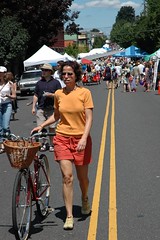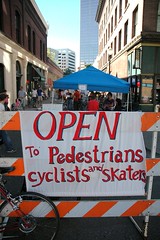
My recent post on the efforts of PDOT to create a ciclovia-type event (which they would call “Sunday Parkways”) somehow made its way to Gil Penalosa.
Penalosa (I previously wrote about his brother Enrique) is the former Commissioner of Parks, Sports and Recreation for the city of Bogota, Colombia. During his tenure in the late 1990s, he led a two-year transformation of their ciclovia program from eight miles and 140,000 riders each Sunday to 70 miles and 1.5 million riders!
Penalosa is now the executive director of Walk and Bike For Life, an Ontario, Canada-based non-profit that promotes walking and biking as recreational activities and transportation options.
He sent me an email with thoughts about a ciclovia in Portland:
“I’m excited about the news that Portland is contemplating doing a ciclovia, even if initially it is for one day; if it is successful (and I am sure it will be) then it can be done all year round. Although (Portland) has a long way to go when compared to Copenhagen or Amsterdam, nevertheless it is a best practice to use as example to show many North American cities what can be done if there is the will and community engagement…
Many North American cities are contemplating the idea and Portland’s example would be most helpful.”
Penalosa says that any city has the basic ingredients for a ciclovia program:
“I find that the ciclovia is a program that can be done successfully anywhere, in a city of 7m like Bogota or a town of 50,000, in Latin America, North America, Europe, Asia… it does not require capital investments as the infrastructure is there, the roads. It does need operational budget and political will (guts!).”
He says community interaction is one of the main benefits of ciclovias:
“It (the ciclovia) is the best that Colombia has to offer: young and old, rich and poor, men and women, novice and experts, tall and short, all! Most people bike, but others run, walk, skate, do aerobics… and in the end, it is about enjoying the presence of each other. Humans enjoy been with other humans, which is why we go to concerts when the sound would be better on an iPod, or we go into restaurants if there are others inside.”
Penalosa also stressed that ciclovias are a highly cost-effective way to provide recreation to large numbers of people:
“The other day I was riding with the Mayor (of Guadalajara, Mexico during their ciclovia event), and I asked him if he could even imagine how many soccer fields or gymnasiums or other sport facilities he would need to build and maintain to provide recreation to 145,000 residents every week, people of both genders, all ages, abilities and backgrounds (social, economic, ethnic, etc). Even if you have only 5,000 participants as in El Paso, you could not provide free recreation to so many.”
I hope someday soon Portland is known for being a leader in the American ciclovia movement. As Penalosa mentions, it will take political and administrative moxie, but since when has anything great ever come easy?



